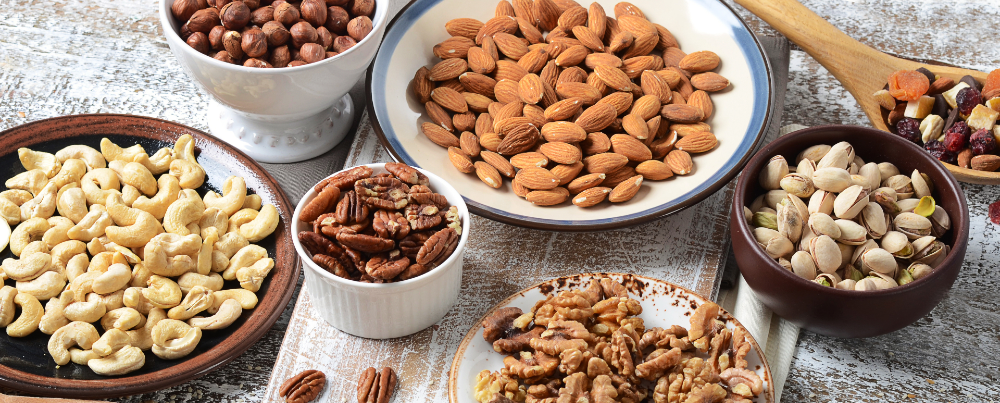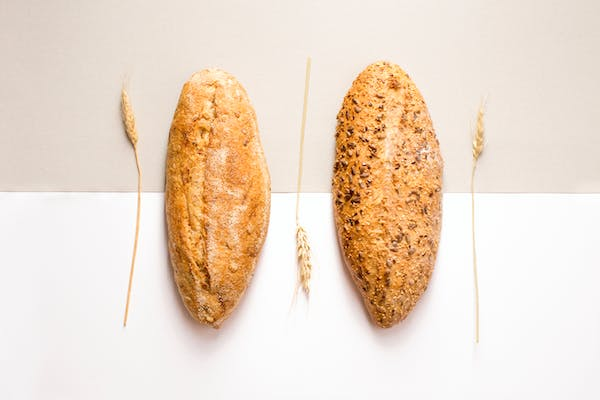Our in-house dietitians provide their expert advice to help those with coeliac disease and nut allergies learn how they can live vegan for less.
Having specific dietary restrictions like coeliac disease or nut allergies can often be seen as a challenge to people who are looking to maintain a vegan lifestyle on a budget. However, our in-house dietitians have some advice to help you maintain a healthy, nutritious gluten-free vegan diet or nut-free vegan diet at an affordable price.
1. Coeliac disease:
Coeliac UK state that “gluten free foods can be on average three to four times more expensive and harder to get hold of than the same foods that do contain gluten”. People with coeliac disease have no choice but to avoid gluten, and with cuts across the UK on gluten-free prescribing, what can a vegan with coeliac disease eat on a budget?
What is coeliac disease?
Coeliac disease is a condition where the body’s immune system attacks its own tissues when you eat gluten, leading to damage to the lining of your gut. It affects 1 in 100 people in the UK with symptoms including bloating, diarrhoea, iron deficiency anaemia, weight loss and fatigue.
What is gluten?
The only treatment for coeliac disease is a gluten-free diet. Gluten is a protein found in rye, wheat and barley; however, most people with coeliac disease also react to a similar protein found in oats. Some people with coeliac disease even need to avoid products that have been manufactured with gluten-containing ingredients, as they cannot tolerate small amounts of gluten from cross contamination.
What does a gluten-free balanced diet look like?
As coeliac disease can cause damage to the gut, your body may not absorb some nutrients as well as it did before. This is why it is important to do a bit of planning before you go shopping so you can eat a balanced diet, as well as keeping to your budget.
Calcium:
Calcium requirements are higher for people with coeliac disease, so aim to eat at least three foods that are rich in calcium every day. Calcium-set tofu is a rich calcium source for vegans. Buying tofu from Asian supermarkets or world food aisles may save you some money. Silken tofu tends to be cheaper than chilled varieties, and doesn’t need refrigerating or cooking, also saving on your energy bill. You can keep stock in the cupboard ready to add to warm soups or blend into a creamy sauce for a protein kick.
Choosing calcium fortified dairy alternatives are an easy way to get more calcium in your diet. Opting for supermarket own branded soya milk and yoghurts will save you more pounds than buying other gluten free varieties, such as pea or hemp milk which often come with a premium price tag.
Iron:
Make sure you are including iron rich foods throughout the day. Most plant-based foods rich in iron happen to be good sources of protein and are gluten free. Lentils, chickpeas, beans, tofu, kale and raisins are some of the cheapest accessible food sources rich in iron. Eat these together with foods high in vitamin C to help your body absorb more iron, such as Brussels sprouts, peppers, pineapple and broccoli. Opting for tinned or frozen varieties can be more cost effective.
Supplementation:
Selective supplementation is so important for anyone following a vegan diet, especially for someone with coeliac disease whose gut may not be as efficient at absorbing some of these nutrients. The nutrients deserving attention, that may be harder to get from plant foods are vitamin B12, vitamin D, iodine and selenium. Luckily, VEG 1 is the most affordable vegan supplement on the market and guess what – it's gluten free!
Shopping tips:
It’s not always necessary to shop in the expensive free-from aisle when doing your gluten-free shopping. Naturally gluten-free products such as rice, quinoa, potatoes, cassava, beans, peas, lentils, chickpeas, fruit, vegetables, nuts and seeds can be used to make up the majority of your meals. But if you are craving a spaghetti bolognese or a vegan sarnie, then here’s some tips to consider:
Look in the reduced to clear section for gluten-free bargains. Remember, you can store bread in the freezer and take out slices at a time.
Choose supermarket own brands when buying gluten-free products to get more bang for your buck.
Know your portions. For example, quinoa may be priced the same as your gluten-free pasta, but a 30 g portion of dried quinoa expands to 80 g when cooked, so a 300 g bag gives you 10 portions. Adding plenty of frozen vegetables and sprinkling with nuts/seeds can spread to lots of nutritious lunches.
Resources
- Gluten-free vegan living | The Vegan Society
- Living with coeliac disease as a vegan | The Vegan Society
- Cost, access and availability of gluten free food - Coeliac UK
- Join us for gluten free support - Coeliac UK
- Gluten Free Recipes - Coeliac UK
- VeganDietforCoeliacDisease.pdf (plantbasedhealthprofessionals.com)
By Andrea Rymer
2. Nut allergies

What is a nut allergy?
According to Allergy UK, tree nut allergy affects 2% of children and 0.5% of adults in the UK. Tree nut allergies are as a result of the body’s immune system response to the proteins in the nut. Sometimes people are allergic to multiple nuts.
Tree nuts are grown on trees, examples include: walnuts, Brazil nuts, cashews, hazelnuts and almonds. Peanuts, however, are considered to be a legume and not a tree nut. Therefore, someone with a tree nut allergy may not automatically be allergic to peanuts. Other foods that sound like nuts but in fact aren’t, are: coconut, nutmeg, chestnuts, butternut squash and pine nuts.
When it comes to food labelling, it’s important to note that vegan standards aren’t the same as allergy or ‘free-from’ standards. You can read more on our allergens and labelling page here.
What nutrients do nuts provide?
Nuts are great sources of healthy fats; they are also a rich source of fibre and some nuts such as cashews and pistachios are particularly good sources of protein. Omega-3 fats are a type of fat found in walnuts and we encourage vegans to ensure they have a source of omega-3 fat in their diet daily. Nuts provide useful contributions of iron, zinc and magnesium in a vegan diet, and they often contain vitamin E and other vitamins and minerals.
Top tips for those with nut allergies
Ensure the diet includes plenty of rich sources of protein from other sources such as chickpeas, lentils and kidney beans throughout the day. These protein sources are very economical, especially when bought dried and in bulk.
Seeds are packed with many nutrients similar to nuts. Sunflower seeds can be used instead of cashews to make creamy sauces for pasta. These as well as pumpkin seeds can be added to yoghurts, salads and granola.
Pumpkin seeds can also be used in foods such as pesto, they also happen to be a relatively affordable seed to buy. When you use squash, why not dry and roast these seeds to be resourceful.
Use chia/flaxseeds (linseeds) for omega-3 fats instead of walnuts. Buying these seeds in bulk online can save on costs in the long run and can be more affordable than buying smaller packets in the supermarket. Please note that it is best to grind flaxseeds fresh and store in either the fridge or freezer to prevent them from going bad.
Nuts are often used for plant milk such as hazelnut and almond milk. However, soya, oat, coconut, rice, pea and hemp milk are nut-free alternatives. Many supermarkets produce plant-milk alternatives which can be cheaper than more expensive known brands. It is important to check the labels to ensure that it is suitable for those with nut allergies.
Nut-free oils such as olive oil and rapeseed oils, which are sometimes labelled as vegetable oil, can be used in the diet in small amounts.
If you are allergic to peanuts, dips such as hummus are a tasty and nutritious alternative to nut butters. Hummus or other bean dips can be even cheaper if you make it yourself.
By Chantal Tomlinson
For more information on well-planned vegan diets, head over to vegansociety.com/nutrition
This blog may not be suitable for everyone that has coeliac disease or a nut allergy. For individual dietary advice please speak to your doctor about a referral to a registered dietitian.
Nuts resources:
- Vegan Living | Allergen labelling | Vegan food (vegansociety.com)
- Going vegan with a soya, peanut or nut allergy | The Vegan Society
- Tree Nut Allergy | Allergy UK | National Charity
The views expressed by our bloggers are not necessarily the views of The Vegan Society.

